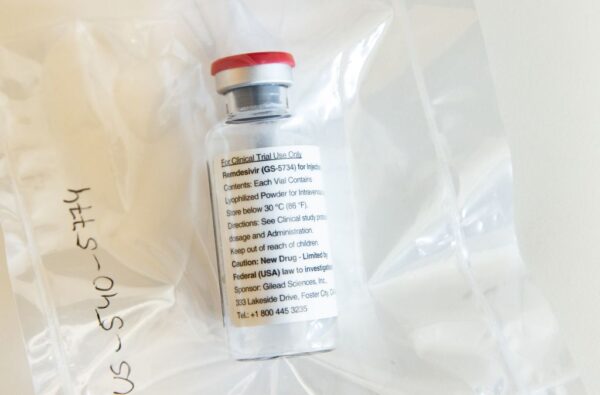
Two studies of an antiviral drug developed by Gilead Sciences for the treatment of Covid-19 have been pronounced as successes, the company said Wednesday.
In two announcements, the Foster City, California-based biotech firm said topline data from its Phase III study of remdesivir in patients with severe Covid-19 had shown similar efficacy for those receiving the drug in five- and 10-day regimens and that it had also received word that a National Institutes of Health-sponsored Phase III study met its primary endpoint.
Shares of Gilead were up 8.9% in premarket trading on the Nasdaq and were up 5.4% when markets opened.
For the company-sponsored Phase III study, Gilead said that the time to clinical improvement for 50% of the 200 patients in the five-day treatment group and 197 in the 10-day treatment group was 10 days and 11 days, respectively. More than half of patients in both groups – 120 in the five-day group and 103 in the 10-day group – were discharged from the hospital at day 14. There was variation in terms of geography, with the overall mortality rate at day 14 being 7% across both groups outside of Italy. However, as many have noted, the severe-disease trial does not have a control arm, which complicates efforts to assess its efficacy based on those data alone.
“Unlike traditional drug development, we are attempting to evaluate an investigational agent alongside an evolving global pandemic,” Gilead chief medical officer Merdad Parsey said in a statement. “These study results complement data from the placebo-controlled study of remdesivir conducted by the National Institute for Allergy and Infectious Diseases and help to determine the optimal duration of treatment with remdesivir.”
Data from the NIAID study are regarded as being more consequential because that study is a randomized, double-blind and placebo-controlled. Although Gilead said it had been informed that results showed the study was successful, details of the data will be provided at an upcoming briefing.

A Deep-dive Into Specialty Pharma
A specialty drug is a class of prescription medications used to treat complex, chronic or rare medical conditions. Although this classification was originally intended to define the treatment of rare, also termed “orphan” diseases, affecting fewer than 200,000 people in the US, more recently, specialty drugs have emerged as the cornerstone of treatment for chronic and complex diseases such as cancer, autoimmune conditions, diabetes, hepatitis C, and HIV/AIDS.
In a note to investors, RBC Capital Markets analyst Brian Abrahams wrote that the data mean the drug is likely to get regulatory approval. “Remdesivir effect size details will be key and we would not anticipate based on prior data it will necessarily be dramatic, but any benefit should contribute to helping manage the ongoing crisis,” he wrote.
Another analyst, Baird’s Brian Skorney, found the data from Gilead’s severe-disease study somewhat disappointing. While noting that it is hard to make any meaningful interpretation because it’s an open-label study, the data do not make remdesivir look “exceptionally effective” as they do not stand out relative to natural history studies, he wrote, pointing to the study’s two-week mortality rate of 9% and an 8% rate among intubated patients in a Cornell University cohort study in New York. Results from the NIAID study will ultimately define the drug’s role, he added.
The announcements follow a slow drip of data from various remdesivir development programs that, while causing shares of the company to gyrate, have not provided a real picture of whether or not remdesivir is an effective drug. These include ostensibly positive data from a few dozen patients receiving the drug under compassionate use, a favorable discussion of more than 100 patients in the severe-disease study from a single center in leaked video footage and ostensibly negative data from a prematurely terminated Chinese study.
Photo: Ulrich Perrey, Pool/AFP, Getty Images













